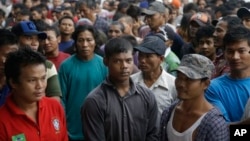Indonesian authorities are stepping up investigations into the fishing industry after authorities found nearly 550 enslaved fishermen on a remote Indonesian island. The International Organization for Migration (IOM) is working with the Indonesian government and embassies to support legal cases against the fishing companies at the center of the charges.
The village on Benjina Island in the Arafura Sea had been the focus of a special investigation by the Associated Press news agency, which reported that hundreds of men, many of them from Myanmar, were trapped on the island.
On Friday reports said the numbers of enslaved fishermen had reached almost 550 following a fact finding mission that included members of the International Organization for Migration (IOM).
IOM deputy chief of mission in Jakarta, Steve Hamilton, said while 210 Burmese wanted to leave, there were others refusing to go, fearful of surrendering years of back pay if they did leave. Hamilton said legal steps are under way to assist the men, many of whom are Cambodians.
“We’ll follow up with the Embassies and the victims to try and get restitution and compensation. I think that’s another way to approach the men who are afraid to leave because they afraid they’re losing years and years of back pay if they walk away, that at least they see someone is on their corner,” he stated.
Hamilton said the Indonesian authorities plan to investigate the fishing industry across the entire Indonesian archipelago.
On Thursday, more than 60 Thai fishermen returned to Bangkok on board a Thai Air Force C-130 after being rescued from the island of Ambon where many had lived in hiding or held by Indonesian authorities as illegal immigrants.
The youngest Thai to be rescued was 19 and had endured six years on the vessels, working days on end without sleep in horrendous conditions.
Thailand investigation
The AP report published in March triggered several investigations across the region, including in Thailand, and in key export markets for seafood including the United States and Europe.
Thai media have raised questions for several years about the use of immigrant labor in the fishing industry generally.
The rescued fishermen said they were lured or kidnapped to work in the fishing industry, often facing violence and threats from senior crew members.
Thailand-based Migrant Working Group spokesperson, Roisa Wongsuban, said the region needs to improve cooperation in dealing with trafficked workers in the fishing industry. “Now it’s about regional dialogue rather than regional response to the problem. This is what we observe and we don’t see the practice change much on the way they rescue people who have been trafficked, smuggled. They use Thailand even and a hub for recruiting making fraudulent documents,” she said.
Analysts said the Indonesia government already was aware of the issue of illegal use of labor in the fishing industry. But the recent media reports, they said, provided the necessary impetus for the government to the launch investigations, amid calls for greater regional cooperation to halt the illegal labor practices.
Indonesia to Investigate Fishing Industry After Slaves Found on Island
- Ron Corben
- VOA News

BANGKOK —








